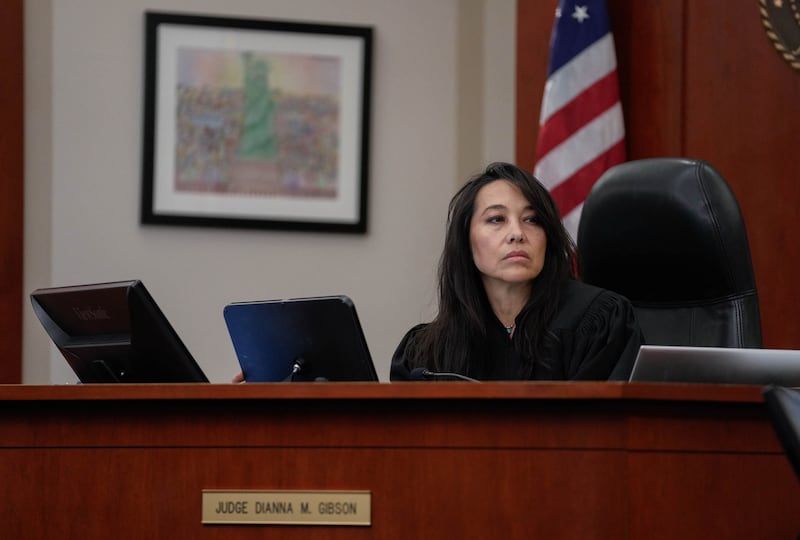SALT LAKE CITY — A judge heard arguments Thursday about Utah’s new proposed congressional maps and the statistical tests lawmakers picked to evaluate their fairness.
During a hearing at Matheson Courthouse in Salt Lake City, attorneys for the plaintiffs who sued over the state’s congressional map — which 3rd District Judge Dianna Gibson threw out in August — presented arguments about why they believe a new map from the Republican-controlled Legislature unfairly favors the GOP.
Meanwhile, attorneys for the Legislature — who are scheduled to present their case on Friday — tried to poke holes in the arguments while questioning testimony from expert witnesses hired by the plaintiffs.
This is the latest step in a whirlwind, contentious process of redrawing the boundaries determining who represents Utahns in Congress, further highlighting tensions between the state’s legislative and judicial branches of government.
‘Extreme partisan favoritism’
Thursday’s hearing focused on Map C, the remedial map adopted by state lawmakers earlier this month after the map in place since 2021 was thrown out. Gibson has until Nov. 10 to approve that map or select one of two maps submitted by the plaintiffs, who filed a complaint after Map C was adopted, alleging that the Legislature cherry-picked fairness standards to draw a map that favors Republicans.
The plaintiffs called on Jowie Chen, an associate professor of political science at the University of Michigan, to make that argument.
“It is an extreme partisan outlier,” Chen told the court. “It is more heavily Republican than almost all of the computer-simulated plans.”
Chen based his testimony on 10,000 maps he generated to comply with the standards of Proposition 4, Utah’s 2018 ballot initiative on redistricting. Based on those simulations, Chen said, the map picked by lawmakers scored lower on several fairness tests than the vast majority of maps he generated.
In a report he prepared for the court, Chen noted that “Map C’s extreme partisan favoritism cannot be explained by Proposition 4’s neutral criteria. … I likewise conclude that Utah’s political geography cannot explain Map C’s extreme partisan favoritism.”
Chen also took issue with one of the tests Republican lawmakers codified to evaluate the fairness of maps: the partisan bias test. The test includes taking the average partisan vote share of five statewide races from the previous three election cycles and comparing it to the new congressional districts. Using that test, the maps would be considered unbiased as long as the margins favoring Republicans in each of the four congressional districts are smaller than the average statewide margin of victory.
But Chen said the measure is inappropriate in a state like Utah, which has only four congressional districts and is not competitive at the statewide level.
“It requires us to go into this hypothetical world in which Utah is not a two-thirds Republican state, but instead is a 50-50 state,” he said, “and that’s simply not realistic in Utah.”
Attorneys for the Legislature pressed Chen on the algorithm he used to generate his maps, citing concerns that the method sometimes creates multiple duplicate districts across different maps. The defense had Chen read excerpts from a 2024 journal article claiming he had “cosmetically altered” his sample of maps in a similar case in New Mexico in order to say that no two districts were the same.
Asked if the assertions were true, Chen called them “a complete lie.”
Millcreek couple testifies
The court also heard from a Millcreek couple who were among the original plaintiffs who sued over the state’s congressional map in 2022. That map famously divided Millcreek among all four of Utah’s congressional districts, something Victoria and Malcolm Reid have argued dilutes the city’s voice and their opportunity to meaningfully participate in elections.
Victoria Reid took the stand Thursday, saying she was “very excited” to support Proposition 4 and “really disappointed” when lawmakers changed it before adopting their own map in 2021.
“It carved up my city into all four congressional districts,” she said of that map, “and I feel like it was making me lose my sense of community.”
While she said Map C is an improvement, she is still not satisfied because it splits her city into two districts in several different places.
“It’s better, but I don’t really feel like the map respects our community,” she said.
But attorneys for the Legislature pushed back, asking if the Legislature’s recent actions prevent her from casting a vote, donating to her preferred candidates, or attending fundraisers and rallies.
“I can still do that,” Reid acknowledged.
Asked later about that same thing, her husband Malcolm Reid said the underlying issue remains.
“Yes, I can vote,” he said, “but my vote is less effective when people who are in my community of interest have been carved up and put in another district.”
What’s next?
The hearing will continue on Friday at 8:30 a.m. with arguments from attorneys for the Legislature. Gibson will then select a map to be used in next year’s midterm elections.
Meanwhile, a Republican Party-backed push to overturn Proposition 4 — and get rid of the new congressional map — is underway. The party has until Nov. 15 to gather the signatures needed for both efforts to move forward.


